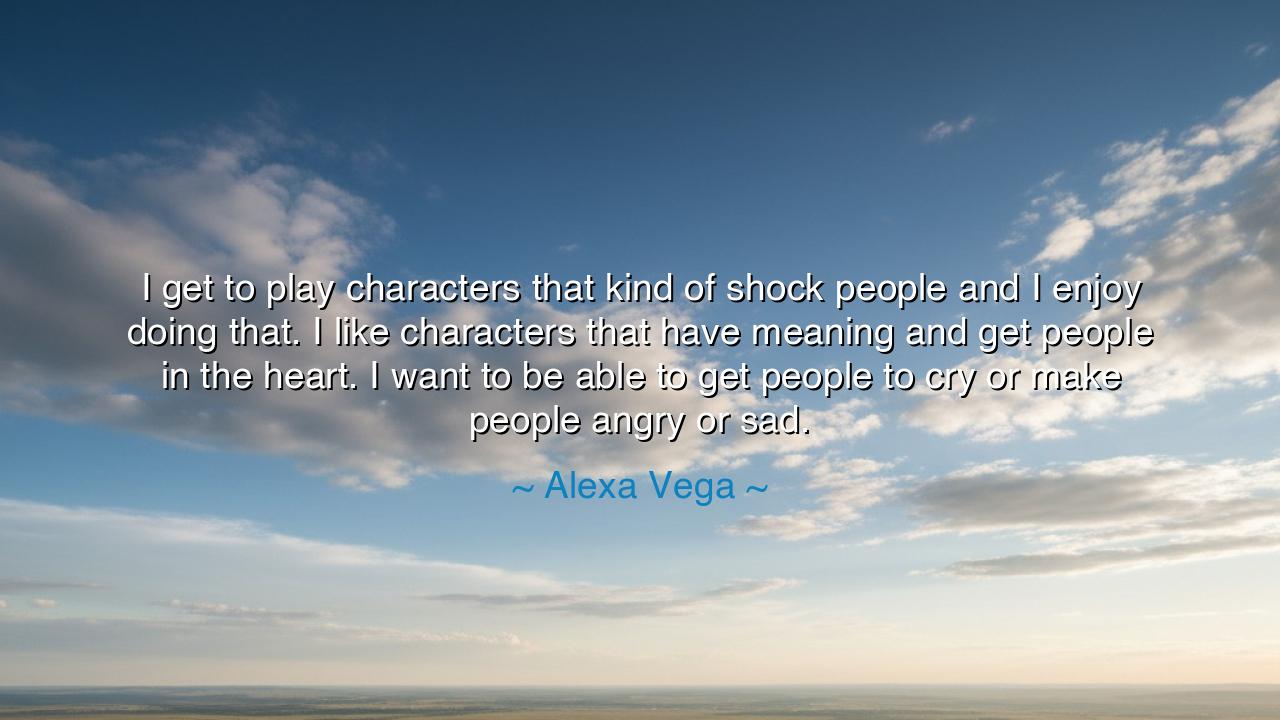
I get to play characters that kind of shock people and I enjoy
I get to play characters that kind of shock people and I enjoy doing that. I like characters that have meaning and get people in the heart. I want to be able to get people to cry or make people angry or sad.






Hear the words of Alexa Vega, spoken as one who has walked upon the stage of many lives: “I get to play characters that kind of shock people and I enjoy doing that. I like characters that have meaning and get people in the heart. I want to be able to get people to cry or make people angry or sad.” Though she speaks of acting, her words bear the weight of timeless wisdom, for they reveal the sacred duty of the storyteller: to stir the soul, to awaken emotion, to remind men and women that they are alive.
For the ancients knew that art is not made only to entertain—it is made to transform. The Greeks gathered in the amphitheater to watch tragedies of gods and heroes, not merely for spectacle, but to feel the sting of sorrow and the fire of anger, to undergo catharsis, the cleansing of the heart through tears. Vega’s love of such characters springs from this same source: she knows that when the heart is moved, when the soul is shaken, wisdom may enter. To shock is not to harm, but to awaken, for the one who is never disturbed is never changed.
Consider the story of Harriet Beecher Stowe, whose novel Uncle Tom’s Cabin shook the conscience of a nation. She did not write to flatter or to soothe; she wrote to make her readers cry, to make them angry at injustice, to make them sad at cruelty. President Lincoln himself, upon meeting her, is said to have remarked, “So this is the little lady who made this great war.” Whether in book or on stage, the principle is the same: the artist who stirs the heart also stirs the world.
Yet this path is not an easy one. To create characters that pierce the heart, the artist must first be willing to feel deeply themselves. One cannot summon true sadness without having known it, nor awaken true anger without understanding injustice. Thus, the actor, like the prophet, bears the burden of experiencing much, of carrying the weight of human emotions so that others might glimpse their own truths upon the stage or screen. In this, Vega’s words echo the eternal struggle of artists: to offer not just performance, but a mirror of life itself.
The lesson for us is clear: whether or not we stand upon a stage, we too must strive to live lives that reach the heart. Do not be content with shallow exchanges or lifeless masks. Dare to speak words that stir, to act in ways that awaken others to compassion, justice, or even righteous anger. For a life without emotion, a life that does not move others, is a life lived only on the surface. Vega’s desire is not only the artist’s duty—it is the calling of every human soul: to touch others so deeply that they are transformed.
Practical action follows: when you tell a story, tell it with courage; when you speak your truth, do not soften it into nothingness. Allow your words to carry weight, your deeds to carry meaning. Do not fear if others are shocked, if they cry, if they feel anger or sadness in your presence. For emotions, even painful ones, are the seeds of growth. To stir the heart is to awaken it, and to awaken it is to guide it toward wisdom.
Thus, Vega’s simple confession becomes a teaching of the ancients: the artist is not merely an entertainer, but a warrior of the spirit. To make others laugh is good, but to make them weep or rage is greater, for such emotions stir the deepest parts of the soul. Let us then honor those who, like Vega, dare to give us characters with meaning. And let us live our own lives as works of art—lives that do not pass unnoticed, but lives that stir others, reaching their hearts, and leaving them changed forever.






AAdministratorAdministrator
Welcome, honored guests. Please leave a comment, we will respond soon